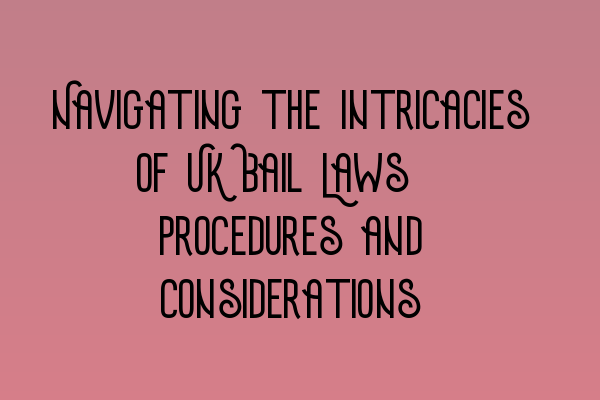Navigating the Intricacies of UK Bail Laws: Procedures and Considerations
When it comes to criminal law in the UK, one area that often causes confusion and raises numerous questions is the complex web of bail laws. Navigating through these intricacies requires a solid understanding of the procedures and considerations involved. Whether you are a legal professional, a law student, or just someone seeking information, this blog post will serve as a guide to help you grasp the key concepts of UK bail laws.
The Basics of UK Bail Laws
Before we delve into the procedures and considerations, let’s start with the basics. Bail is the temporary release of a person charged with a crime, pending their trial or other legal proceedings. The purpose of bail is to ensure that the accused person will return to court without the need for detention. However, granting or refusing bail hinges on a number of factors.
First and foremost, the court must determine whether the accused poses a flight risk. Factors such as ties to the community, employment status, and previous criminal records are taken into account. Additionally, the court assesses the risk of the accused interfering with witnesses or obstructing justice. If the risks are deemed low, bail may be granted, subject to certain conditions.
The Bail Process in the UK
The process of applying for bail can be complex and time-consuming. It typically involves the following steps:
- Arrest and Initial Detention: When a person is arrested, they are usually taken into custody. In some cases, the police may release them without charge. If charged, they are brought before a magistrate or a judge.
- Bail Application: The accused person or their legal representative can make an application for bail. This can happen at any stage of the legal proceedings, even before charges have been laid.
- Bail Hearing: The court will hold a hearing to consider the bail application. During this hearing, the prosecution and defense will present their arguments.
- Bail Decision: Based on the information presented, the court will make a decision regarding bail. They may grant bail with conditions, refuse bail, or remand the accused in custody until the trial.
Considerations in Bail Applications
When making a bail application, several considerations come into play. It is important to address these factors effectively to increase the chances of a successful application. Some of the key considerations include:
- Flight Risk: Demonstrating strong ties to the community, such as permanent residence, employment, or family commitments, can help alleviate concerns about flight risk.
- Character and Reputation: Presenting evidence of good character and a positive reputation within the community can contribute to a favorable bail decision.
- Supportive Relationships: Providing details of supportive family and friends who are willing to act as sureties can strengthen a bail application.
- Mental Health and Vulnerability: If the accused has mental health issues or vulnerabilities, it is crucial to present this information to the court, as it may influence the decision regarding bail.
Bail Conditions and Variations
When bail is granted, the court may impose conditions that the accused must adhere to. These conditions can vary widely depending on the circumstances of the case. They may include:
- Regular reporting to a police station
- Surrendering of travel documents
- Non-contact orders with specific individuals
- Restrictions on movements or residence
- Prohibition from certain activities
It is important for the accused to understand and comply with these conditions, as any breach can result in their bail being revoked.
Conclusion
Navigating the intricacies of UK bail laws can be challenging, but with a solid understanding of the procedures and considerations involved, you can effectively advocate for your clients or make informed decisions for yourself. Remember, it is always advisable to seek professional legal advice for specific cases to ensure the best possible outcome.
For further resources on the SQE exams and preparation, please refer to our related articles:
